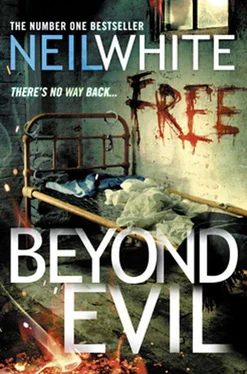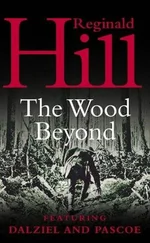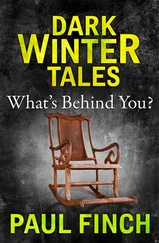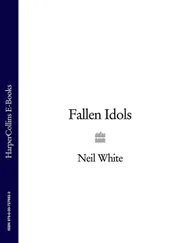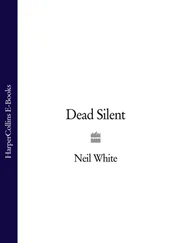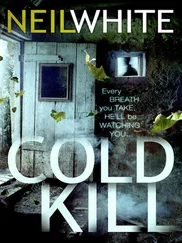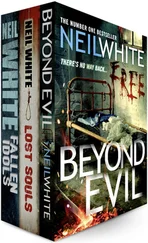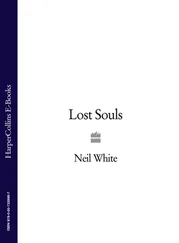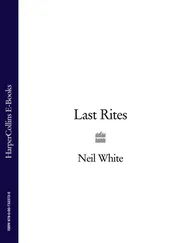Charlie was being selfish, he knew it, but he couldn’t bring Amelia back. He had to look out for himself, because they wouldn’t get any nearer to finding out who killed her if the police focus was all on him.
Except that what he was about to do could look even worse, because if he just left and someone remembered him through the twitch of a curtain, they would want to know why he hadn’t called it in. Charlie felt like the last piece on the chessboard, the white king being pursued around the board, with no winning move possible but not willing to give it up.
He looked at Amelia and told her that he was sorry, that he hoped she would forgive him if it turned out that his religious views had always been wrong, and that she was looking down on him. Then he backed out of the room.
Charlie was about to go to the back door when he heard a car pull up outside.
He went to the window, stepping round Amelia. As he looked through, he saw the two men in suits who had been at the office the day before, the private payers, emerging from a silver Audi. What were they doing here? They were clients, Amelia had said that.
They were talking to each other, looking around, and then they set off towards the front door.
Charlie panicked. He looked down at Amelia, and then back at the two men getting closer along the path. Did they have something to do with it?
He bolted for the back garden, the patio door opening with a swish. There was a knock on the door as he ran along the lawn, the pounding of his feet loud in his ears. He scrambled over the fence at the back, and then lay on the floor as he tried to get his breath back. He waited for a shout from one of the neighbours, but it was quiet.
The grass tickled his cheeks, his breaths hot as he panted into the ground. There was the sound of cars in the distance and the loud thump of his heart, and then he heard the clink of the gate. He remembered it from his own walk around the side of the house. They were going in the same way, so would find the same thing that he had. Amelia, dead. Or perhaps they already knew that?
Charlie was trapped. His car was further along Amelia’s street, but he couldn’t go back to it. They would see him. They might even know that it was his car, so would come looking for him. He had to get away from there.
Noises came from the back of the house. Hisses, angry voices.
Charlie started to crawl along the ground, trying to keep his head down. He looked along towards the reservoir and the paper mill, wondering if anyone was watching. There was a path that ran alongside the water and then disappeared into trees before coming out by a grid of terraced streets. If he could get that far, he knew a short cut back to his apartment building.
He crawled quickly so that he could get to a point where he could look natural, as if he was coming from a different direction. He tried not to grunt or shout out whenever his knees hit a stone, and soon he knew that he was out of sight of the house. He straightened and tried to make like he was out for a walk, although he was in a suit and there was a sheen of sweat on his face, putting a gloss to his grey pallor and making the graze on his cheek brighter. None of this was natural, and he knew that people would remember him, because as soon as Amelia’s body was discovered there would be shockwaves in the town. People knew her. That was the way with defence lawyers, because the court stories are what people read in the local paper, and so the defending lawyer gets a name. So they will remember the tall man in a crumpled suit, his hair wild, his face covered in greying stubble, creeping round the house and crawling through the field. He would have to explain why he did nothing, but until then he had to work out what had happened to Amelia. He owed her that much.
Chapter Twenty-Five
Sheldon walked slowly through the streets of Oulton. It seemed quiet to him, even though the streets were busy. People were still curious about the murder, and so the activity around the police station attracted onlookers, those who were grateful to have something to fill their day, just hanging around, sharing cigarettes. But it was as if they knew to stay away from him as he shuffled along, each step taking him further away from the police station, one step nearer to an uncertain future.
The parish church was ahead, dark grey stone with a high Norman-style tower at its centre, square with castellated ridges and a white-faced clock on each side. It had dominated the skyline of the town for five hundred years, from when Oulton was just a small wool trading village and the church served as the religious centre for the surrounding farms. It had drawn Sheldon today, as if he was seeking somewhere quiet to reflect.
The low drone of the traffic was lost immediately as he went inside. Sheldon’s movements echoed and seemed to bounce between the majestic stained-glass windows. He looked up and felt small, insignificant. The ceiling was high and arched, traversed by oak beams, the lines broken by carved rosettes where they intersected, overlooking the black and white checks of the aisle. He let his hand trail over the pews as he went towards the altar, and when he got there, he sat down. He closed his eyes and tried to find some solace in all the years that the church had been there, that his problems meant nothing.
But as he sat on the pew they all came back to him, the deaths, right back to his first, a bony old man found dead in his flat, killed for his pension money, the bravery that had made him carry a gun in wartime spilled over a blood-soaked rug, his life taken away in front of framed pictures of his grandchildren. And so the movie flew forward again, past car crash victims and fights that went too far, once more juddering to a halt at Alice Kenyon, floating lifelessly in Billy’s pool, her hair trailing around her like rags caught on a branch.
Sheldon got to his feet. The church brought him no comfort. For all the years of prayer, he wasn’t sure any had been answered. Good people died, bad people lived. That seemed to be always the way, and Billy’s murder didn’t change that balance. It was a blip. He stepped up to the altar, unsure of what he was doing, but then saw a stone doorway that opened onto steps that would take him upwards in the tower. Sheldon thought of the view, the fields and hills surrounding Oulton, and he had an urge to go up there.
He looked around to make sure no one was watching and then stepped into the tower. As he started to climb, the steps felt suffocating, winding in a tight spiral so that all Sheldon saw as he got higher was more stone, more steps, turning, getting narrower, so that he wondered whether he would reach nothing but a dead-end. But he was wrong. He burst gasping onto the roof, a small square hemmed in by the castellated ramparts of the tower. As Sheldon headed for the wall, he was breathing hard, the effort of the climb making his chest pump hard. Sweat flashed across his forehead, and as he pitched forward, the ground below swayed and blurred.
Sheldon looked forward instead and sucked in clean air as he let the horizon settle down. It was as he imagined. The roll of the hills on the other side of the valley, and the chimneys and terraced streets in the nearby towns. As he looked further, he could see how the green around him turned grey and ugly as the sprawl of Manchester took over.
He was cold. He was wearing just his suit, and although the sun was shining, the exposed tower chilled the wind, so that he folded his arms to try and keep warm. He felt his ribs under his fingers and wondered how they had got there. He knew he hadn’t been eating that well, surviving on sandwiches and microwave meals, but he was surprised. But then as he thought about it, he couldn’t remember his last meal.
Читать дальше
Конец ознакомительного отрывка
Купить книгу
